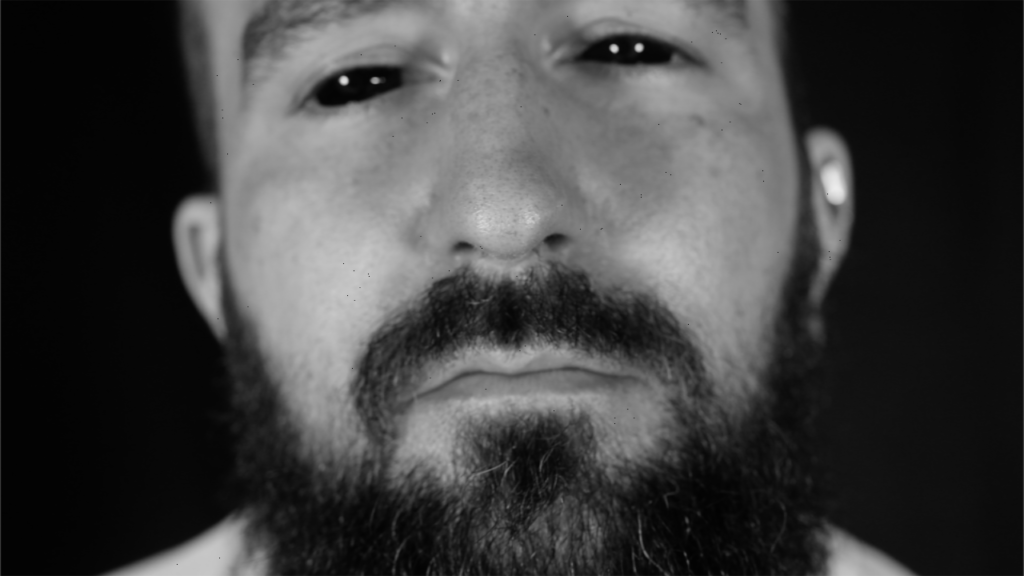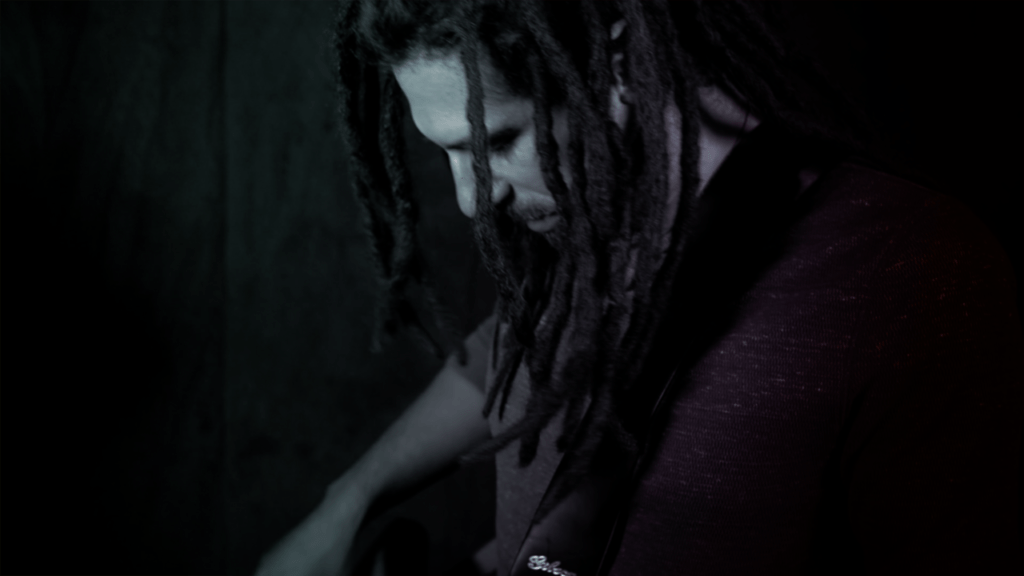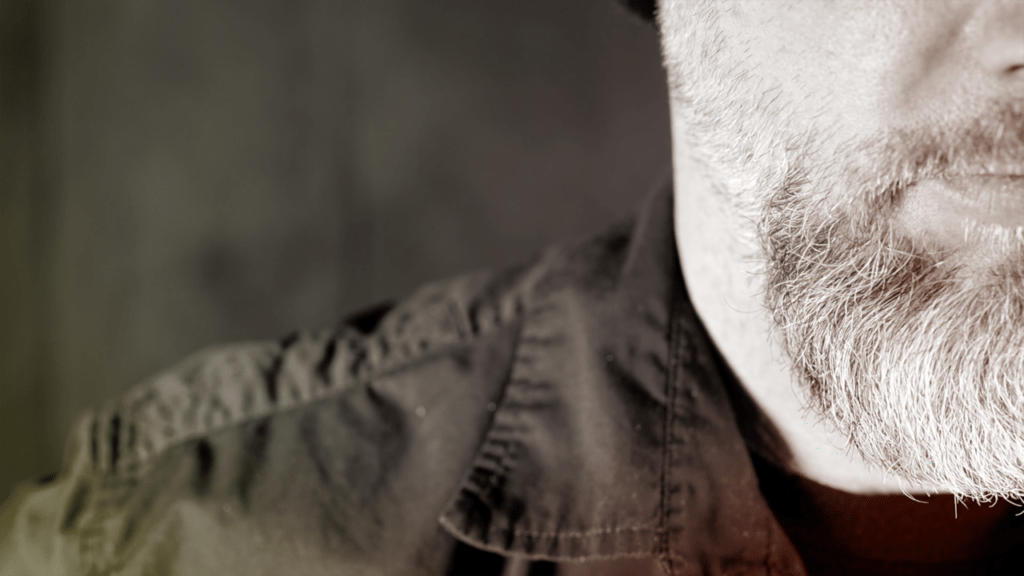elitefitrea is an electronic rock, grunge and post-industrial project by Bryan Day, a former marine & former prison inmate. On December 21, 2019 elitefitrea released the first long-lenth album ‘Lethe‘ and together with companion instrumental album ‘lleetthhee’ that consists of Lethe’s tracks exported at half-speed.

Cover of ‘Lethe’ album
You’ve mentioned that in the prison you played in two bands. But when did you start playing music? Were there any musical projects before that?
I started learning to play guitar when I was 15. My interest in rock music progressed from youth group songs to my dad’s Led Zeppelin records, and then to heavy metal. I jammed along with Metallica albums after school.
By the end of high school I became very inspired by the Deftones’ White Pony and Around the Fur. I also played in a high school band with some friends. We didn’t do very much with it, but we did perform in a talent show, which we won. I have a VHS copy of it somewhere.
While in the military, a friend gave me a cracked version of FL Studio. One day I happened to revisit The Downward Spiral after messing with computer music for a few months. I gained a new appreciation for Trent Reznor. It planted the seeds for how I do music today, but it’s been a long journey.
There weren’t really any serious projects before elitefitrea.
As I understand, you write music under the influence of depression which took 20 years of your life. What caused that depression?
My depression was an undiagnosed food sensitivity which caused mood disorder symptoms. It was an all-consuming suicidal depression which I drowned out with increasing levels of alcohol. I was probably an alcoholic but I happened to be pretty functional.
I fantasized about death and dying quite a lot. Self-immolation. I would daydream about it. I was also very lonely. Eventually it turned to psychosis and I was diagnosed with schizoaffective disorder at one point.
In prison, I learned that it’s better to just be a downer if that’s what you are. Living like this made me happier which also made me more outgoing and talkative. I adopted several habits for coping and living with it. Then around age 31 or 32 I began practicing an elimination diet and the depression disappeared within a week. I had been living with it since age 12. It was like stepping into an alternate reality.
Depression like that prevents you from relating to most music, or at least that’s how it was with me. The music I enjoyed while I was depressed is the same kind of music I enjoy today. Tortured instruments, alien landscapes, that sort of thing. I also enjoy moody piano music. Chopin’s nocturnes for instance, Debussy pieces, Satie pieces, etc. I’m hearing them everywhere now so maybe it’s time to change that.
What did you do to become incarcerated? And what is the relationship between depression and incarceration?
There was a point that I started to look at my life more critically. For all of my reasoning and intelligence, I was not able to achieve desirable outcomes. Depression kept me trapped at a lower level of cognitive functioning.
But it was difficult to see that for myself. The problem with depression is that good and bad choices feel the same. Success and failure both end with suicidal urges, emptiness and pointlessness. So, I had a habit of making unconscious or lazy choices. I was groundless and directionless, sometimes playing guitar and writing half-songs on FL Studio. I didn’t make very much money either, despite working 60-hour work weeks.
In ’07 or ’08 I decided to change my perception in a way that allowed me to orient towards success despite my depression. Part of this was abandoning reason to see where that led me. I began to make decisions based on superstitious thoughts, synchronicities, coincidences, manifestations, and stuff like that. I used jars of coins, cards, and other divination-like methods to answer questions about what I should do in my life rather than using my own mind.
Things got weird very quickly. I saw synchronicities everywhere. It felt like spirits had become aware of me and were observing me. I felt invisible hands touching my face, head, and neck every day. I had psychic conversations with my future self, and with non-physical entities. I learned about the afterlife from my past and future selves. At one point I saw and spoke with an alien peering at me through an open door – probably the most terrifying experience of my life. And I’m not even sure what the hell any of that actually was. But it seemed to me at the time that I had discovered another way of living in the world. Some kind of ancestral way of relating to reality.
During this time I bought a house and found a great job — probably the best job I’ve ever had. But I also committed some crimes, the worst of which was setting an old man’s house on fire. Specifically, the father of an ex-girlfriend. I caused around $8,000 worth of damage, and left enough evidence to make sure I got caught. My motives were multi-varied and highly irrational. But looking back, I think it was mostly just a way to commit suicide without dying.
To answer your question specifically, the relationship between depression and incarceration is, that for depressed people, they have two big problems. One, they’re closer to the edge, sanity-wise. And two, they have less to lose. They have a greater likelihood of committing some kind of crime. From my experience, all crimes are suicides. You’re daring the universe to kill or get rid of you. And you’re also murdering everything you could have been.

Bryan Day
Why have you chosen post-industrial?
Post-Industrial plays really well to to my strengths and capabilities. And it’s the most freeing genre. You can use any instruments; any mix of samples and real sounds, synthesizers, effects, etc.
Post-Industrial also overlaps very well with classical music. Almost to a point where it does the same job as classical music, and in a way that other genres simply do not. It feels more connected to the past and future for that reason.
You say that your music is for people who needs energy and a “hope in hell”. To be honest, it is not my first interview with a musician who has an unlucky biography and writes music to make others feel they are not alone and their lives are not the worst ones (if I understood the main concept correctly).
Is it a popular trend in US now?
Well, my biography is not so unlucky as it might appear at first glance.
But yes, I have noticed the trend. Lately, it’s got me reconsidering the artist’s role. People can be rescued by music, to be sure, but it’s better not to generate music with that particular intent. Doing that makes you vulnerable to exploitation by the political ouroboros that is destroying art today. Music by an outcast can help another outcast feel less alone. But music can’t be what people are trying to make it be today. People are intermingling politics and secular religion into music and art. It’s sleazy, disgusting; and also drowning in irony. It’s an interesting phenomenon to portray artistically, actually. There’s a fine distinction there. But it can’t fix society.
Seeing artists engage in what can only be described as a kind of savior complex has also made me realize that…well, it’s kind of sad, and seems to come from a place of disempowerment. I suppose I’ve transcended my own disempowerment to be able to see that. Artists don’t need justifications or rationalizations for why they want to play music. Musicians are crazy and that’s perfectly fine on its own.
Usually when I search for an info about a musician I find a lot about music and only few words about musicians themselves. In case of you I see an opposite situation. Is it a part of your concept?
I think it’s more that I have such an unusual story compared with other musicians. There’s not really that much to talk about with most artists. Not that that’s a bad thing, of course. But a lot of musicians adopt a fake attitude to make up for not having anything to their lives. On top of that, a lot of artists like to talk about hardships. But meeting a person like me, with the things I’ve faced, can make them feel a lot of doubts about the things they’ve staked their identities on.
When I was locked up I made the decision to include my life story in my bio and make it synonymous with the music. People can be pretty weird about felons. I prefer that they show their true colors about that up front.
There’s irony in that as well. Growing up, a lot of the rappers on the radio that my friends listened to had these criminal histories. I grew up overseas so it was kind of a new idea to me when I came to America. But even to ask about it was considered sort of taboo. To talk about it — people reacted with irrational hostility if you even broached the subject. So I grew up thinking it was pretty normal for an artist to have a shady history or even a downright terrifying one.
Needless to say – it’s a little eye-opening to see some of the public reactions to my history in light of such experiences. I have seen hypocrisy you wouldn’t even believe. But of course, more and more people are seeing it.

Colin Tremblay, bass
Let’s return to music. What is more important for you: the lyrics or the music?
The music is more important. Music should convey what you’re trying to say before you’ve even said a single word. But I have a somewhat tortured relationship with lyric-writing as its my weakest skill. I don’t have conscious control over it. Usually I write music, then hum some melodic phrases as I’m writing, and my brain will spontaneously cough up a string of words. And that’s what happens. Later I sort of do an interpretation-after-the-fact of what the words mean. And I do have a sort of hazy intent with my songs as I write them, but usually the words sneak up on me.
Do you have musical education?
A little bit. A few years of guitar lessons when I was a teenager. Some music theory. A few semesters of classical piano after prison. The rest has just been listening to other artists. I played a lot of acoustic guitar in prison as well. Lots of major pentatonic.
I don’t have a degree in music and I don’t have tons of playing or singing experience. I wanted to play drums and piano from a very young age but I was dissuaded from music by my family.
Please, tell us more about your bandmates. How did they came to the project?
How did they started to play music? Did they participate in any other musical projects before?
Well, I met my guitarist in a prison band program. He was one of the three inmates facilitating the program. He’d already been locked up for two or three years by the time I met him. He had a 20-year sentence for a crime he didn’t commit. They released him 10 years early, actually, which is how he came to play in my band. But he was writing music under the name Pilatefish… he recorded an unbelievable amount of music in prison using a multi-track recorder, a drum machine, and guitar amp modeler built into the recorder. He’s got literally albums worth of material.
My bassist also plays in this metal-core band called Iron Krill. It’s a band him and his high school buddy started, I think. It’s this sort of parody thing. Like, they have a metal-core version of a Christmas song, I think.
As I expand and dedicate more resources to each project I want to enroll more people into the process. I’d also like to have some in-house people eventually.

Chris Straubing, guitar
When you compose a new song what do you start with? How do you compose your songs?
It’s a little different each time.
The Center started with me playing a few notes on guitar. Too Late started with a patch on my Sub Phatty. Lethe came from a few tuned major-chord notes on a monosynth.
Usually a song will come from giving myself space to try something out or experiment with a piece of gear. If it feels good I’ll develop it into something more.
Is music your main job?
I wouldn’t say it’s a job per se. But I don’t have any other jobs. Most jobs don’t pay enough to justify the time sink. If you’re a musician, I mean.
Being a musician is kind of like a curse. You can’t live a normal life. And I don’t mean that work is for suckers or anything. I’d actually be so happy to just work somewhere random if I wasn’t obsessed with this stuff.
But a musician is better off being a homeless-van-guy than an entry-level job guy. Prison showed me how to survive as an ascetic. I had to learn how to make it into an ascetic thing to be able to pull it all off.
I also learned that it’s better to just be a prisoner if I can’t do what I want to do with my life. That realization freed me up a lot. When I got out of prison I was living on $30 a week for food. Whatever I could do to free up my time and my mind.
What are you going to do next?
I just finished a small tour with a charity that plays music for at-risk youth. We played with them for about a month and did like 10 shows. Met a lot of cool people.
I’m settling into a new house with my wife, landscaping my yard, taking care of chickens, and writing songs for the next album. I’ll also be doing a remix EP shortly.
After that? Videos, shows, promotion, networking, etc. Lethe is just the tip of the iceberg for the future.